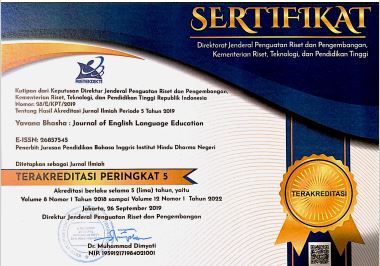“HOW I LEARN ENGLISH IN EFL CONTEXT”: A PSYCOLINGUISTIC ANALYSIS ON SECOND LANGUAGE ACQUISITION OF ADULT LEARNERS
DOI:
https://doi.org/10.25078/yb.v7i1.3550Keywords:
Psycholinguistics, Second Language Acquisition, Adult LearnerAbstract
This study explores the psycholinguistic phenomenon in the context of second language acquisition of adult learners who work in hospitality industry at tourist destinations, with a case study at popular tourist sites in Bali. The main goal of this research is to identify and analyze the strategies and challenges faced by workers in learning and using a second language in their daily interactions with foreign tourists. This study utilizes primary data collected from direct observations and interviews with 55 workers at various tourist sites in Bali. Respondents were selected based on criteria such as having regular interactions with foreign tourists and at least one year of work experience in the tourism sector. Additionally, secondary data was obtained from a literature review of previous studies on psycholinguistics and second language acquisition. The methodology employed is a qualitative descriptive approach, in which the collected data is analyzed to understand the psycholinguistic aspects of second language acquisition. The results indicate that factors like a multilingual work environment and customs, personal motivation, age, and social support play a significant role in the process of acquiring a second language. Three main types of strategies identified in second language learning are cognitive, social, and affective strategies. This research provides new insights into second language acquisition in the tourism setting and recommendations for second language learning for tourism practitioners.








